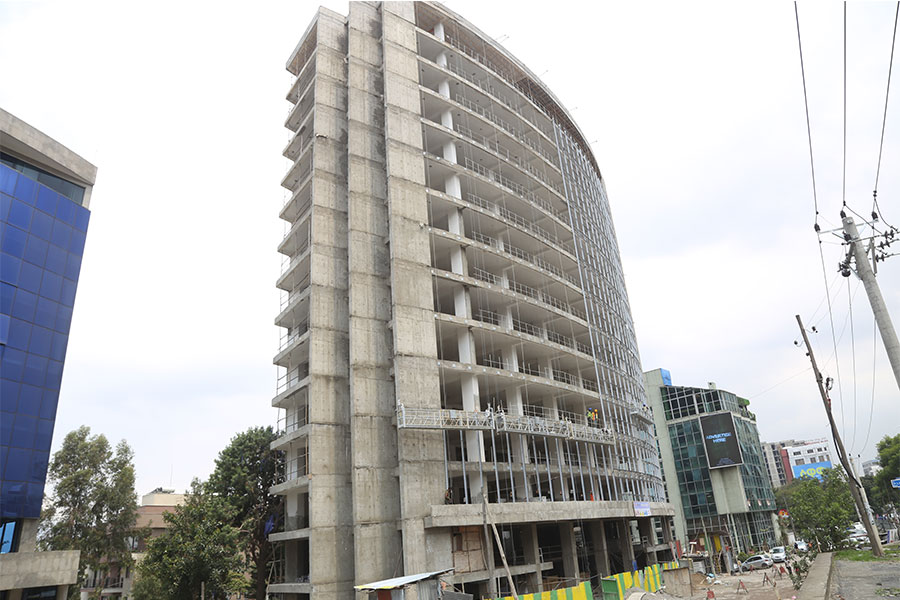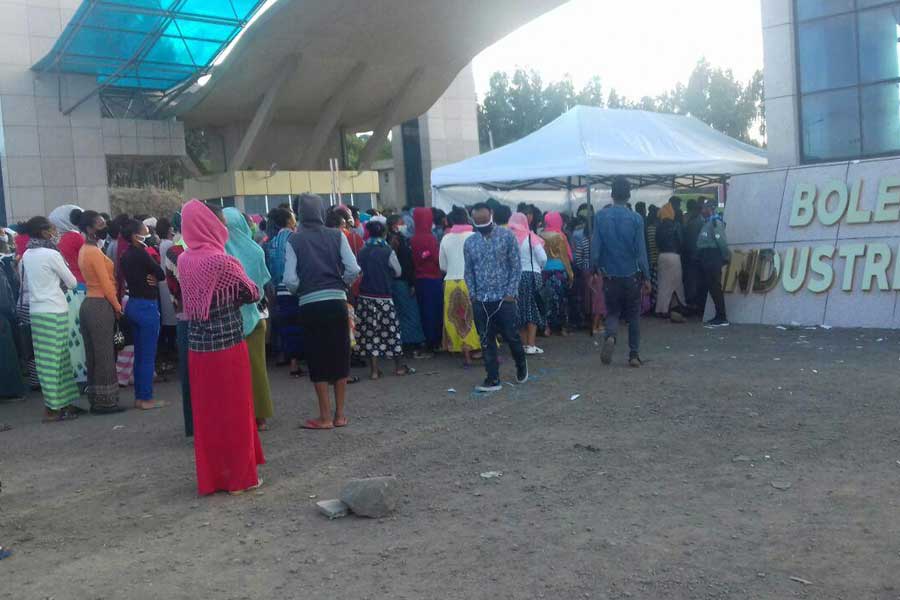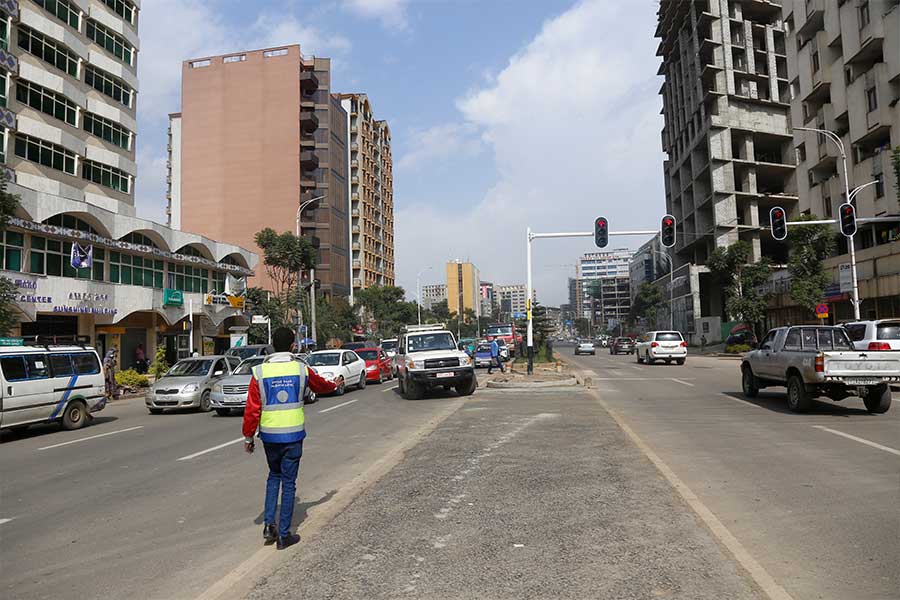
Radar | Oct 23,2021
Jun 1 , 2024
By Carolyn Kissane
On my way home last week, I found myself inside a taxi behind a Gen-Z couple. They exuded youthfulness, and throughout the journey, they conversed fluently in English. Their impeccable accents hinted at a prestigious education, perhaps from a renowned private institution or simply from avidly watching American cinema.
It should not have surprised me. During my high school years, many students, myself included, conversed the same way. But fluency seemed a rarity, only possessed by those who attended international schools, belonged to diasporas, or were part of the elite. As I reminisced, I realised that I was in a Bole taxi, where such conversations were the norm, setting it apart from other taxi experiences.
Due to ongoing construction work at 4 Kilo, our taxi was compelled to take an alternate route. Bole, a place where many of my generation spent our leisure time and enjoyed ourselves during our teenage years, held a special place in our hearts.
It had been years since I last visited the Bole Atlas area (Namibia St.), and as the taxi passed by, I felt as though I had been transported to a different realm. The sight of exquisite restaurants, cafes with impeccable interior designs, clothing stores adorned with luxurious and expensive garments and accessories, as well as large pharmacies and liquor stores, illuminated the entire area.
I was left in awe, momentarily forgetting that I resided on the other side, where people patiently queued for taxis day in and day out, regardless of whether it was a holiday or not. Although there were cafes in the vicinity, they lacked the opulence and grandeur of those near Bole Medhanealem. I captured a mental image of the exquisite garments that I shall acquire on my next visit, while I cannot help but apprehend their exorbitant price tags.
This entire incident has awakened me to the realisation that it will inevitably foster a culture of consumerism. If I frequented or worked in the vicinity, it would have been highly probable that I would indulge in lavish shopping sprees. However, a solitary purchase will not satiate the insatiable appetite.
The relentless pursuit of material possessions and services has become dominant in contemporary society. While it undoubtedly propels economic expansion, its effects on the younger generation are particularly troubling. It has the potential to transform from a mere method of fulfilling basic needs into a never-ending cycle that obstructs personal development, transforming individuals into followers of fads rather than encouraging them to invest in meaningful experiences and self-improvement.
It can also inhibit financial responsibility, as young people may develop detrimental spending habits, exacerbated by the convenience of online shopping platforms, ultimately leading to debt and a skewed perception of their capabilities.
The pursuit of material possessions can take away from time spent on personal growth. Young people might focus on earning money to buy things, leading them to prioritize part-time jobs over activities that encourage learning and exploration. This shift can prevent them from developing important skills like critical thinking, problem-solving, and creativity. As a result, they might miss out on valuable opportunities to volunteer, develop artistic talents, or participate in sports, all of which are important for personal growth.
The effects go beyond individuals and create a society focused on instant gratification. Ultimately, consumerism not only hinders personal growth but also promotes wastefulness and a lack of concern for long-term sustainability. Adopting a "fast fashion" mindset, and quickly discarding clothes and electronics to follow the latest trends, undermines sustainability and environmental awareness. It prevents valuing quality craftsmanship or the importance of repairing and reusing items.
We need to encourage a critical and mindful attitude towards consumption. By discussing responsible budgeting, delayed gratification, and the importance of saving for long-term goals, we can help young people make better financial decisions. Investing in youth development directly leads to a more skilled and prepared future workforce. Providing quality education, mentorship programs, and life skills training equips young people with the tools they need to succeed professionally.
This creates a more productive and innovative workforce, which boosts economic growth and national competitiveness. Investing in the youth's well-being and education helps create a generation of financially secure and responsible consumers.
Investors traditionally favour retail and hospitality enterprises, but it is time to focus on a more noble cause: companies dedicated to youth development. By supporting these organisations, investors contribute to the empowerment of future generations while also unlocking social and financial benefits. Youth development offers a range of investment opportunities, from online learning platforms to mental health support programs, all with the potential for substantial returns.
The success of youth-focused organisations depends on a supportive environment. Investors can play a key role by connecting these enterprises with educational institutions, non-governmental organisations, and other stakeholders to ensure effective initiatives and wider reach. By forming strategic alliances, investors can enhance the societal impact of their investments and support the growth of these enterprises.
PUBLISHED ON
Jun 01,2024 [ VOL
25 , NO
1257]


Radar | Oct 23,2021

Fortune News | Jul 20,2019

Fortune News | Jan 22,2022

Fortune News | Jun 04,2022

Fortune News | Jul 25,2020

Radar | Apr 24,2021

Fortune News | Jun 27,2020

Commentaries | Feb 13,2021

Radar | Nov 27,2018

Viewpoints | May 21,2022

Photo Gallery | 176080 Views | May 06,2019

Photo Gallery | 166292 Views | Apr 26,2019

Photo Gallery | 156727 Views | Oct 06,2021

My Opinion | 136876 Views | Aug 14,2021

Dec 22 , 2024 . By TIZITA SHEWAFERAW
Charged with transforming colossal state-owned enterprises into modern and competitiv...

Aug 18 , 2024 . By AKSAH ITALO
Although predictable Yonas Zerihun's job in the ride-hailing service is not immune to...

Jul 28 , 2024 . By TIZITA SHEWAFERAW
Unhabitual, perhaps too many, Samuel Gebreyohannes, 38, used to occasionally enjoy a couple of beers at breakfast. However, he recently swit...

Jul 13 , 2024 . By AKSAH ITALO
Investors who rely on tractors, trucks, and field vehicles for commuting, transporting commodities, and f...

Oct 18 , 2025
The political establishment, notably the ruling party and its top brass, has become p...

Oct 11 , 2025
Ladislas Farago, a roving Associated Press (AP) correspondent, arrived in Ethiopia in...

Oct 4 , 2025
Eyob Tekalegn (PhD) had been in the Governor's chair for only weeks when, on Septembe...

Sep 27 , 2025
Four years into an experiment with “shock therapy” in education, the national moo...

Oct 18 , 2025 . By NAHOM AYELE
In a sweeping reform that upends nearly a decade of uniform health insurance contribu...

A bill that could transform the nutritional state sits in a limbo, even as the countr...

Oct 18 , 2025 . By SURAFEL MULUGETA
A long-planned directive to curb carbon emissions from fossil-fuel-powered vehicles h...

Oct 18 , 2025 . By BEZAWIT HULUAGER
Transaction advisors working with companies that hold over a quarter of a billion Bir...